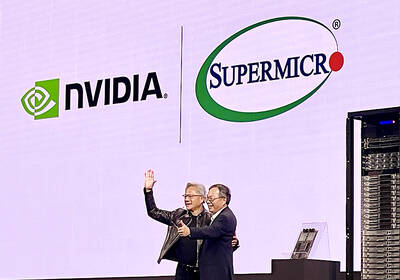A touring exhibition of 15 paintings about Taiwanese democracy pioneer Chiang Wei-shui (蔣渭水) has opened at the Hsinchu Bureau of Cultural Affairs’ Meiyuan Gallery (梅苑畫廊).
The paintings, by renowned Hsinchu artist Liu Yang-che (劉洋哲), were commissioned by the Chiang Wei-shui Cultural Foundation (蔣渭水文化基金會) about a decade ago, when Liu was asked to create paintings depicting Chiang’s life and achievements in the 1920s.
One of the paintings, which is exclusive to the Hsinchu exhibition, depicts a historic pro-autonomy demonstration in 1926 against the Japanese colonial regime in Hsinchu.

Photo: Hung Mei-hsiu, Taipei Times
Hsinchu Mayor Lin Chih-chien (林智堅) said that actions taken by Chiang’s movement during the Japanese colonial period — such as demanding that the Japanese government establish a representative assembly in Taiwan, and his founding of the Taiwanese Cultural Association, Taiwanese People’s Party and the Taiwan Minpao (台灣民報) newspaper — heralded the beginning of Taiwan’s democracy movement and political enlightenment.
The painting depicting a demonstration at Hsinchu Station in support of Chiang’s call for a representative assembly is a “testament to Hsinchu Station’s importance in history and Hsinchu residents’ support for democracy,” Lin said.
He said he was also moved by another painting depicting an incident in which Chiang was covered in mud thrown by hecklers after he delivered a speech, as it showed Chiang’s courage and will because he wore the mud as a badge of pride.
Chiang Wei-shui Cultural Foundation executive director Chiang Chao-ken (蔣朝根), who is Chiang Wei-shui’s grandson, said that Hsinchu has been a “bastion of Taiwan’s democracy movement” and the location of one of the major headquarters of Chiang’s Taiwanese People’s Party.
The exhibition in Hsinchu, which is the eighth stop on the tour, runs through July 24.

TECH SECTOR: Nvidia Corp also announced its intent to build an overseas headquarters in Taiwan, with Taipei and New Taipei City each attempting to woo the US chipmaker The US-based Super Micro Computer Inc and Taiwan’s Guo Rui on Wednesday announced a joint venture to build a computation center powered only by renewable energy. After meeting with Supermicro founder Charles Liang (梁見後) and Guo Rui chairman Lin Po-wen (林博文), Premier Cho Jung-tai (卓榮泰) instructed a cross-ministry panel to be established to help promote the government’s green energy policies and facilitate efforts to obtain land for the generation of green power, Executive Yuan spokesperson Michelle Lee (李慧芝) said. Cho thanked Liang for his company’s support of the government’s 2019 Action Plan for Welcoming Overseas Taiwanese Businesses to Return to Invest in

The Taipei City Government yesterday said contractors organizing its New Year’s Eve celebrations would be held responsible after a jumbo screen played a Beijing-ran television channel near the event’s end. An image showing China Central Television (CCTV) Channel 3 being displayed was posted on the social media platform Threads, sparking an outcry on the Internet over Beijing’s alleged political infiltration of the municipal government. A Taipei Department of Information and Tourism spokesman said event workers had made a “grave mistake” and that the Television Broadcasts Satellite (TVBS) group had the contract to operate the screens. The city would apply contractual penalties on TVBS

The lowest temperature in a low-lying area recorded early yesterday morning was in Miaoli County’s Gongguan Township (公館), at 6.8°C, due to a strong cold air mass and the effect of radiative cooling, the Central Weather Administration (CWA) said. In other areas, Chiayi’s East District (東區) recorded a low of 8.2°C and Yunlin County’s Huwei Township (虎尾) recorded 8.5°C, CWA data showed. The cold air mass was at its strongest from Saturday night to the early hours of yesterday. It brought temperatures down to 9°C to 11°C in areas across the nation and the outlying Kinmen and Lienchiang (Matsu) counties,

A new board game set against the backdrop of armed conflict around Taiwan is to be released next month, amid renewed threats from Beijing, inviting players to participate in an imaginary Chinese invasion 20 years from now. China has ramped up military activity close to Taiwan in the past few years, including massing naval forces around the nation. The game, titled 2045, tasks players with navigating the troubles of war using colorful action cards and role-playing as characters involved in operations 10 days before a fictional Chinese invasion of Taiwan. That includes members of the armed forces, Chinese sleeper agents and pro-China politicians